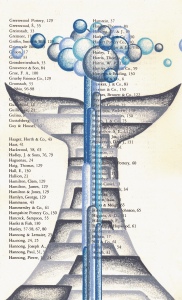 |
| via |
Reviewed by Connie and Ingrid
Published: 1851
It's about: Do you really not know? A huge sperm whale with a white hump bit off the leg of Captain Ahab, and he's pissed. This book is about his journey to seek revenge, told from the perspective of whaling newbie Ishmael. During our readalong last month, we outlined the plot in detail. Check out our posts here:
Connie thought: This was not the adventure story I always thought it would be. In fact, it is pretty much devoid of adventure until the last 30 pages. And to be honest, I really, really detested parts of this book. Try as I might, I kept struggling to see each chapter as a short story, as another blogger recommended to us. Had we not been hosting a read-along, I probably would have given up on this classic yet again.
 But boy, am I glad I didn't. By the end of the novel, I got it. I finally saw what it's all about -- humanity, and life and death, and the purpose of living. Goals and relationships and religion. And it's wonderful. I'm not itching to read it again, and I still don't understand the random stage directions, but I was surprised at how much I ended up liking this book.
But boy, am I glad I didn't. By the end of the novel, I got it. I finally saw what it's all about -- humanity, and life and death, and the purpose of living. Goals and relationships and religion. And it's wonderful. I'm not itching to read it again, and I still don't understand the random stage directions, but I was surprised at how much I ended up liking this book.Ingrid thought: Like Connie, I wasn't so sure about this book ... until I finished it and thought about it a little bit. Then I decided I loved it. Like I said in the last post of our read-along, my favorite thing about this book was how organized it was. This is any person with OCD's dream book. Each chapter tells you about some specific aspect about the whale or about whaling that all leads in to the climactic series of events at the end. Melville really, really wants you to fully appreciate what happens here, and so he tells you about the shape of the whale's head, its skeleton, how the ropes work on the whaling ship, exactly what happens when a whale is killed, etc etc etc. Sure, it can get a little tiring, but so what? You can take a break and come back to it. And it will be worth it.
 | ||||||||
| "To be short, then, a whale is a spouting fish with a short tail. There you have him." Pg 128. Matt Kish |
Reading Recommendations:
Check out Moby-Dick in Pictures: One Drawing for Every Page by Matt Kish.
To supplement our discussion during our readalong, Ingrid read Why Read Moby Dick by Nathaniel Philbrick. Vanity Fair has a short article on it here. We especially liked this quote:
"Even so, in our day, Moby-Dick is the most reluctantly read of the American classics. Not only is the book long; many of its 135 chapters appear to have nothing to do with the tale of Captain Ahab’s pursuit of the White Whale. But the novel, like all great works of art, grows on you. Instead of being a page-turner, Moby-Dick is a repository of American history and culture and the essentials of Western literature. The book is so encyclopedic that space aliens could use it to re-create the whale fishery as it once existed on the planet Earth in the midst of the 19th century.
In fact, we have become those space aliens, the inhabitants of a planet so altered by our profligate presence that we are living on a different Earth from the one Melville knew. And yet the more our world changes, the more relevant the novel seems to be."
Warnings: Other than a little spermaceti innuendo, this classic is squeaky clean
Favorite excerpts:
On the whiteness of the whale - "Is it that by its indefiniteness it shadows forth the heartless voids and immensities of the universe, and thus stabs us from behind with the thought of annihilation, when beholding the white depths of the milky way? Or is it, that as in essence whiteness is not so much a color as the visible absence of color; and at the same time the concrete of all colors; is it for these reasons that there is such a dumb blankness, full of meaning, in a wide landscape of snows- a colorless, all-color of atheism from which we shrink?"
"Consider all this; and then turn to this green, gentle, and most docile earth; consider them both, the sea and the land; and do you not find a strange analogy to something in yourself? For as this appalling ocean surrounds the verdant land, so in the soul of man there lies one insular Tahiti, full of peace and joy, but encompassed by all the horrors of the half known life. God keep thee! Push not off from that isle, thou canst never return!"






